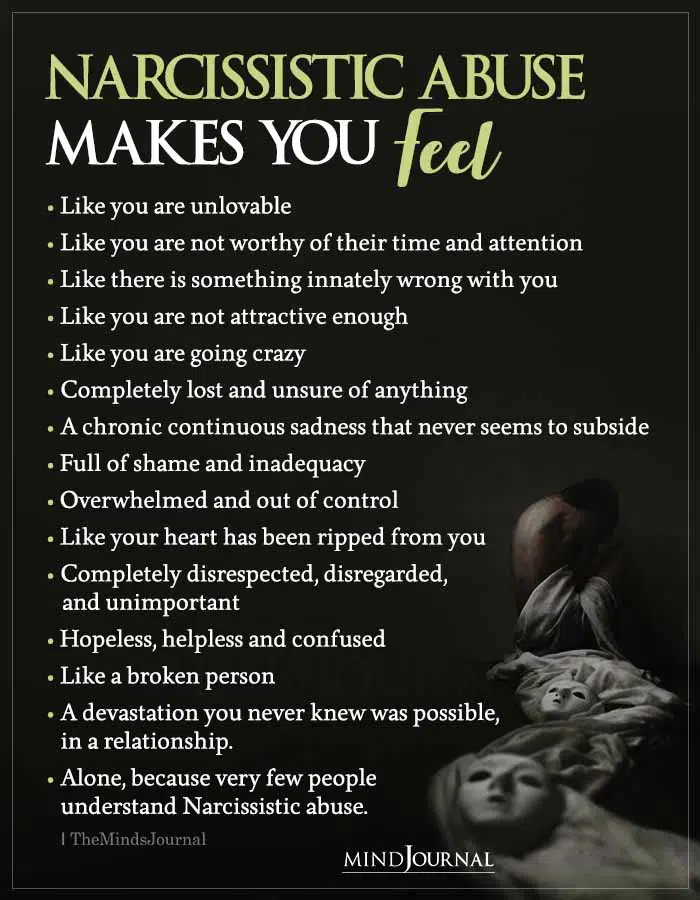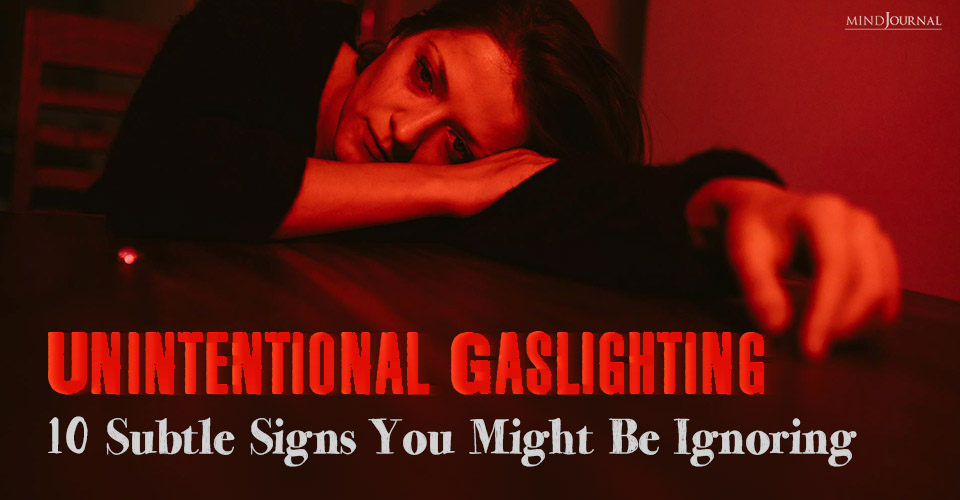Have you ever heard of the term “brain fog”? Brain fog is like a maddening haze that seems to muddle your thoughts, makes you forget what you were saying, and has you searching for your clothes in the trash bin? Well, today we are going to talk about a specific sort of brain fog – brain fog after narcissistic abuse.
Imagine that you have just escaped from a toxic and abusive relationship with a narcissist. You are slowly picking up the pieces and trying to get your life back in order, but somehow you feel like your head is not in the right place. Everything still feels very odd and you still feel very lost.
Even though you are free from the clutches of your narcissistic ex, this bizarre mental fog just won’t lift. Let’s explore how narcissists cause brain fog, and the link between brain fog and narcissistic abuse.
Related: 9 Strategies to Cure Emotional Hangovers After An Energy Vampire Encounter
Brain Fog After Narcissistic Abuse: 8 Ways Narcissists Do This
1. They gaslight you to no end.
Narcissists are absolute masters of gaslighting, and it’s probably one of their favorite ways of tormenting their victims. They enjoy seeing you confused and questioning yourself and your sanity.
They will go to any lengths to deny the truth, twist facts, and make you doubt your sense of reality and perception. Constant gaslighting will gradually lead to more confusion and self-doubt within you, ultimately resulting in brain fog.
2. They cause cognitive dissonance through their actions.
If you are dealing with brain fog after narcissistic abuse, then this is one of the major reasons behind that. They often contradict themselves or act in ways that don’t align with their words.
This sort of inconsistent and dishonest behavior starts to take a mental and emotional toll on you, as you struggle to make sense of their behavior. You find yourself mentally strained and unable to cope with their ever-changing words and actions, leading cognitive difficulties.

3. They repeatedly cause chaos in your life.
There’s no end to a narcissist’s demands, and if you have ever been in a relationship with one, you know how true that is. Their demands are endless and on top of that, they’re always causing chaos.
They fail to fulfill any of their responsibilities, and naturally this load falls on you. Living like this day in and day out becomes stressful to say the least. You often find yourself taking responsibility for them and their things, and as we all know long-term stress does lead to brain fog.
4. They isolate you from your friends and family.
One of the signature moves of a narcissist is that they will always isolate you from the people you love, so that it’s easier for them to control and manipulate you. But they will do this gradually, and you won’t even realize it before it’s too late.
Constant isolation and the loneliness and lack of external perspectives that result from it, play a huge role in causing brain fog.
You find yourself becoming more and more dependent on the narcissist (because you have no one else, the narcissist made sure of that!), and their distorted sense of reality.
Related: What Is Brain Fog? Causes and How To Get Rid Of It
5. They don’t let you sleep properly.
What is the link between brain fog and narcissistic abuse and sleep? Lack of sleep is one of the biggest reasons behind brain fog, and when you are with a narcissist, sleep seems like a distant dream.
They might have deliberately tried to disrupt your sleep by waking you up in the middle of the night, or start a serious argument just when you are getting ready to go to bed. They do this, because they know that lack of sleep will make you feel disoriented, tired and weak, and it will be easier for them to control you.
Moreover, being with a narcissist will always keep you under stress, so naturally it will be hard for you to sleep soundly at night, because you will be worrying about everything!
6. They make sure you are always on an emotional rollercoaster.
Dealing with a narcissist often means being on an emotional rollercoaster 24×7. They can be charming one moment and cruel the next, leaving you constantly on edge. The emotional turmoil and unpredictable behavior can overwhelm your mind and create a foggy mental state.
You never know which side of them you are going to get, because even the smallest and irrelevant mistake can make them fly into a rage. Narcissistic brain fog is no joke, and this constant emotional strain can make you feel like you are going crazy.

7. They convince you that you will never be good enough for them.
The thing is narcissists know your worth and they know very well that you deserve better, that’s why they always go out of their way to make you feel the opposite. Narcissists will criticize everything you do, and will constantly make you feel like you’ll never measure up to them.
No matter how much you try to make them feel happy and special, they are always miserable and ungrateful. But you keep on trying to win them over, without knowing that it’s a lost battle you’re fighting.
Constantly trying to prove that you are good enough can be emotionally exhausting and can take a toll on your mental health. This sort of confusion and stress gradually leads to narcissistic brain fog.
8. They leave you traumatized and unable to cope.
Brain fog after narcissistic abuse becomes a certainty the moment you unknowingly fall for a narcissist. How narcissists cause brain fog, you wonder?
Narcissistic abuse can lead to post-traumatic stress disorder (PTSD). Flashbacks, intrusive thoughts, and hyperarousal associated with PTSD can seriously affect your cognitive functioning and contribute to the chances of developing narcissistic brain fog.
Dealing with PTSD is not a joke, and it can haunt you for the rest of your life. And dealing with brain fog after narcissistic abuse just adds to your suffering.
Related: How Narcissistic Abuse Changes You
Brain fog and narcissistic abuse are intricately connected, even though many survivors may not realize it. Being with a narcissist for a long time does take a massive toll on you, emotionally, mentally and physically.
Brain fog after narcissistic abuse is a legitimate psychological response. Recognizing these effects can help you understand your experiences and take steps toward healing and reclaiming mental clarity.











Leave a Reply